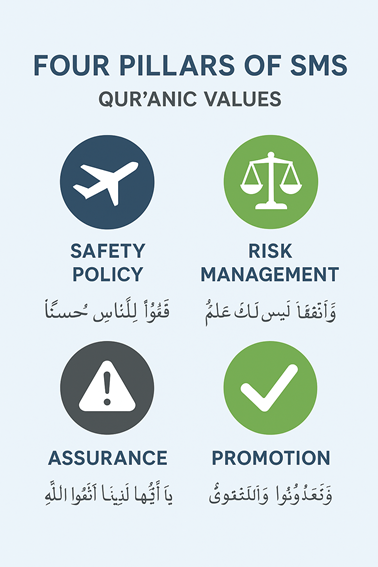Introduction: When Aviation Safety Meets Spiritual Wisdom
In August 2007, the Indonesian aviation sector reached a turning point. A series of accidents involving commercial airlines—Garuda’s runway overrun in Yogyakarta, Adam Air’s crash into the Makassar Strait, and several near misses—shook public confidence. International watchdogs, including the European Union, went as far as blacklisting Indonesian carriers. The pressing question was: how could Indonesia restore faith in its skies? The answer was twofold: enhancing technical compliance with the Safety Management System (SMS) as mandated by ICAO, and simultaneously embedding safety culture within the nation’s spiritual and cultural fabric. Indonesia, with the world’s largest Muslim population, possesses a unique reservoir of wisdom in the Qur’an and Hadith—texts that speak not only of faith but also of stewardship, responsibility, and the sanctity of life. This essay examines how the four pillars of SMS—Safety Policy, Risk Management, Safety Assurance, and Safety Promotion—can be narrated and contextualized through Qur’anic values, offering Indonesia a framework where technical rigor aligns with spiritual guidance.
1. Safety Policy: Leadership as a Trust (Amānah)
Every airline and airport must establish a safety policy that guides decisions, resource allocation, and accountability. In Qur’anic terms, this is not merely a corporate requirement but a divine trust.
Allah says:
إِنَّ ٱللَّهَ يَأْمُرُكُمْ أَن تُؤدُّوا۟ ٱلۡأَمَـٰنَـٰتِ إِلَىٰٓ أَهۡلِهَا
“Indeed, Allah commands you to render trusts to whom they are due.” (Qur’an, 4:58)
When applied to aviation, leadership must recognize safety not as a negotiable cost centre but as an amānah—a sacred obligation to passengers, employees, and the wider community. In 2018, after the tragic Lion Air JT610 crash, investigations revealed lapses in safety oversight and communication between regulators, operators, and manufacturers. Had safety been embraced as a sacred trust, transparency and accountability might have been stronger, potentially preventing systemic failures.
Thus, a Qur’an-inspired Safety Policy would not only affirm compliance with ICAO standards but would also embed moral accountability—where CEOs, directors, and regulators stand answerable not just to shareholders but to God and society.
2. Safety Risk Management: Anticipating Hazards with Foresight (Basīrah)
SMS requires systematic identification of hazards, risk assessment, and implementation of controls. In essence, it is about seeing the unseen risks before they manifest.
The Qur’an reminds:
يَـٰٓأَيُّهَا ٱلَّذِينَ ءَامَنُوا۟ ٱتَّقُوا۟ ٱللَّهَ وَلۡتَنظُرۡ نَفۡسࣱ مَّا قَدَّمَتۡ لِغَدࣲ
“O you who believe, be mindful of Allah, and let every soul consider what it has prepared for tomorrow.” (Qur’an, 59:18)
This verse resonates deeply with aviation risk management. It calls for foresight (tanẓur), a proactive mindset where safety managers do not wait for accidents to expose weaknesses but constantly evaluate “what we have prepared for tomorrow.”
Consider the 2015 Trigana Air crash in Papua, where weather, terrain, and outdated navigation infrastructure intersected. A robust risk management system would have anticipated the compounded hazards of Papua’s mountainous geography, poor weather data, and limited CNS/ATM facilities. Embedding Qur’anic foresight here means ensuring operators never reduce safety margins for short-term gains.
3. Safety Assurance: Continuous Monitoring as Accountability (Hisāb)
Safety assurance in SMS demands regular audits, data monitoring, and verification to ensure that risk controls are effective. It is not a one-time compliance but a cycle of continuous vigilance.
The Qur’an emphasizes accountability:
فَمَن يَعْمَلْ مِثْقَالَ ذَرَّةٍ خَيْرًۭا يَرَهُۥ. وَمَن يَعْمَلْ مِثْقَالَ ذَرَّةٍ شَرًّۭا يَرَهُۥ
“So whoever does an atom’s weight of good will see it, and whoever does an atom’s weight of evil will see it.” (Qur’an, 99:7–8)
In aviation, this principle manifests through Flight Data Monitoring (FDM), Fatigue Risk Management Systems (FRMS), and safety audits. Nothing goes unnoticed, just as no atom escapes divine record.
For instance, following the AirAsia QZ8501 accident in 2014, investigators identified a series of unresolved maintenance warnings. If safety assurance had been robust—ensuring every fault report, however small, was tracked and closed—the chain leading to disaster might have been broken.
Thus, Qur’an-inspired assurance emphasizes meticulousness, that even the smallest indicators (like a recurring sensor alert) deserve attention.
4. Safety Promotion: Building a Culture through Remembrance (Dhikr)
A system thrives only when its people live the culture. SMS calls for education, communication, and training that engrain safety into daily operations.
The Qur’an says:
فَذَكِّرْ إِن نَّفَعَتِ ٱلذِّكْرَىٰ
“So remind, for reminder benefits the believers.” (Qur’an, 51:55)
In aviation, this reminder is safety promotion—campaigns, workshops, crew resource management training—that constantly reinforce vigilance. Human memory fades, but reminders (dhikr) sustain awareness.
Indonesia’s GA sector at Budiarto Airport, currently envisioned as a General Aviation hub, offers a chance to embed this spirit. Safety promotion here must go beyond posters and slogans, embracing storytelling of past accidents, embedding Qur’anic ethics, and making safety “second nature.”
From Spirituality to Public Policy
The bridge between spirituality and policy lies in institutionalizing values. Indonesia’s Ministry of Transportation, DGCA, and airlines can strengthen SMS by explicitly integrating religious–ethical frameworks into technical guidelines.
Some policy directions might include:
Mandatory Safety Leadership Training for airline executives, embedding the concept of amānah (trust) into decision-making.
Risk Forecasting Units that mirror Qur’anic calls for foresight, ensuring hazards in remote regions like Papua are systematically mapped.
Enhanced Data-Driven Oversight, reflecting the principle of hisāb (accountability), where regulators monitor safety performance with transparency.
National Safety Culture Campaigns, designed as reminders (dhikr), combine modern communication with cultural–religious narratives.
The goal is aviation that is Selamanya—Safe, Secure, and Sustainable Forever.
Closing
Aviation, at its heart, is about carrying souls across the skies. The Qur’an elevates the sanctity of life and trust, reminding us that negligence in safety is not merely a regulatory violation but a moral failing. By narrating SMS through the Qur’an, Indonesia can develop an aviation culture that is both globally competitive and spiritually rooted.
As the Qur’an affirms:
وَلَا تَقْتُلُوا۟ ٱلنَّفْسَ ٱلَّتِى حَرَّمَ ٱللَّهُ إِلَّا بِٱلْحَقِّ
“Do not take the life which Allah has made sacred, except by right.” (Qur’an, 17:33)
Every safety measure, every checklist, and every SMS pillar is therefore a commitment to preserve life—a divine obligation carried into the cockpit, the control tower, and the boardroom.

